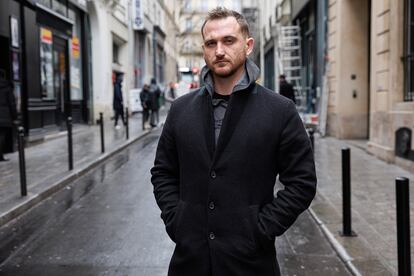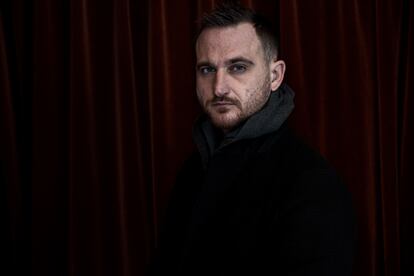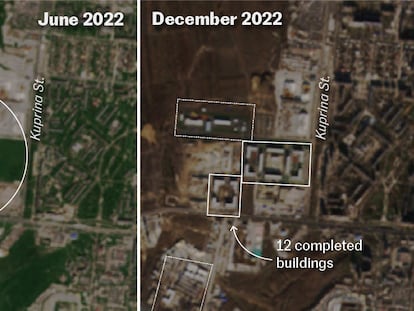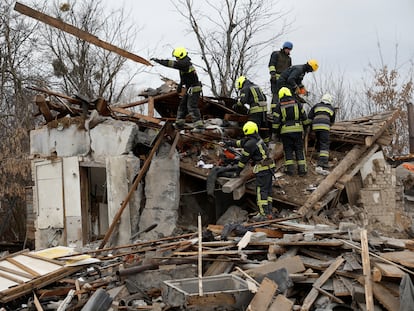Testimony of a Russian deserter: ‘If Putin dies tomorrow, the war is over’
Pavel Filatyev – a former soldier who deserted the Kremlin’s army – has released the first chronicle written by a participant in the invasion of Ukraine. Now living in exile in Paris, he sat down with EL PAÍS to speak about his experiences


“I told myself that I could no longer be part of this.”
Pavel Filatyev – a Russian soldier who participated in the invasion of Ukraine, which began in February 2022 – smokes one cigarette after another in the garden of a charming hotel in the center of Paris. The 34-year-old ex-parachutist speaks about the confusion that he lived through during the first days of the war.
Doubts accumulated in his head from the start. He remembers the moment when he told himself that enough was enough.
“The most difficult thing psychologically was realizing that that war was useless – the decision was the stupidest possible. It was disastrous for Ukraine and it wasn’t going to bring anything good for Russia, either.”
Filatyev doesn’t like being called a deserter. He didn’t abandon his duties overnight. Rather, he took advantage of the fact that he was evacuated from the theater of combat in April 2022 – two months into the fighting – when a shell blasted mud into his eye, resulting in a case of conjunctivitis.
After his recovery, he decided not to rejoin – he began writing his thoughts on an independent Russian website. Eventually, with the help of the New Dissidents Foundation – a Russian NGO – he fled his country in August. He ended up in France – historically known as a safe haven for Russian exiles – where he is now waiting to be granted the status of a political refugee. If he returns to Russia, he says that he could face up to 15 years in prison.
“Like most people in Russia and Ukraine, I didn’t believe that a war was possible,” says Sergeant Filatyev. His first book, titled Zov, has recently been translated from Russian and published in Europe. The word means “call” in Russian, referring to the letters inscribed on the country’s military vehicles.
Filatyev – a former paratrooper with Russia’s 56th Air Assault Brigade – is blunt when asked how all this will end: “If Putin dies tomorrow, the war is over, because he’s the one who’s making it continue.”
Zov – which has been translated into English, French, Spanish, German and other languages – is the first chronicle of the Russian invasion of Ukraine that has been written in the first-person narrative. The style of the book is fluid, raw, fast-paced. He does not talk about warfare or denounce crimes: he portrays war as a chaotic, seedy place. Nobody knows what he’s doing there; there is not enough material, the organization is absurd.
The author is the son of a military man. After joining the army in his youth, leaving it and dedicating 10 years to other jobs, he enlisted again, after the pandemic.
“I didn’t know that a war was going to start,” he explains to EL PAÍS, speaking with the help of an interpreter. “When I found myself in the theater of combat, at first, I was a bit lost, because I didn’t really have any information. When things started – when the missiles started flying – we saw that it was going to be a real war.”
“In every war, there is chaos and disorder. It’s unavoidable. And the belligerents try to bring order. The better organized the state and the army, the less chaos. But given the level of disorder within Russia and the army, the level of chaos exceeded the limits,” he says.
In his book, Filatyev describes interactions with the Ukrainian population: “While we were going through the village at full speed – apart from the confused uncles who formed a circle – I saw several old men who approached the road and greeted us with the sign of the cross. I had an ambiguous feeling: it was not clear if they were sending us to hell, or if they were blessing us.”

In the river city of Kherson, he witnesses scenes of looting.
“Have you ever seen the paintings depicting the sacking of Rome by the barbarians? They would be the best illustration of what was happening in the port. Everyone was exhausted and looking savage. People were roaming through the buildings looking for food, water, a shower, a bed. Some began taking computers and any other valuables they found. I was no exception: I took a hat that I found in a damaged trailer, because my ski mask was not warm at all. But when I saw that electrical appliances were being stolen, even I – who was as savage as the rest, after living outdoors for days – felt ashamed.”
When asked if he witnessed war crimes, he becomes somber.
“The recurring problem was the lack of coordination. If we saw armed people on the roof of a building, we could be ordered to shoot without checking if there were civilians inside. The same goes for aerial bombardments.”
“I think this must have caused civilian deaths. It’s a kind of criminal negligence. But if you want to know if I was a witness to summary executions of prisoners of war or civilians, I never saw this or heard of it in my environment.”
Filatyev measures his words carefully. He does not deny that Russia has perpetrated crimes in Ukraine, but he assures EL PAÍS that he never witnessed them.
The book has not convinced everyone. It has been stressed that not all details can be verified: the author’s version is subjective. The New York Times – in a review published in September 2022 – quoted Russian opposition figure, Ivan Zhdanov: “Honestly, I’m skeptical of [Filatyev’s] decision… why he went [to Ukraine] and fought there.”
Another criticism comes from Vladimir Osechkin – the founder of Gulagu.net – who published the original Russian version of Zov. Osechkin is also the president of the New Dissidents Foundation, which helped the author flee Russia.
“I have lost confidence in him,” Osechkin tells EL PAÍS from the French city of Biarritz. He explains that Filatyev had signed a contract to transfer the rights to the book to the New Dissidents Foundation and a fund for Ukraine. Unexpectedly, he claims, the ex-soldier denounced the contract before a French court, alleging that he had signed it under duress.
To be fair, when the book was a text that circulated free-of-charge on social media and websites, there was little at stake; it is now a potential international bestseller.
Osechkin – who is listed in Zov’s acknowledgments – suggests that Filatyev simply wants to make more money. Then, he mentions something more serious, without offering this newspaper any proof: the possibility that, as the ex-soldier’s mother lives in Russia, the country’s secret police may have blackmailed him into breaking with the New Dissidents Foundation.
“I have sent a letter to his literary agent,” Osechkin says, “telling him to pause the sale of the book’s rights and check the whole story, get all the facts.”
Filatyev sees himself as a victim of his former ally. “This isn’t really a dispute. I see it as an attempt to use me, to swindle me,” he says in the interview. He also questions the reliability of the fund to which he was allegedly supposed to donate the revenue generated by the book.
“They’re trying to discredit my book and my person,” he concludes. “I don’t know if these people have even read my story.”
Sign up for our weekly newsletter to get more English-language news coverage from EL PAÍS USA Edition
Tu suscripción se está usando en otro dispositivo
¿Quieres añadir otro usuario a tu suscripción?
Si continúas leyendo en este dispositivo, no se podrá leer en el otro.
FlechaTu suscripción se está usando en otro dispositivo y solo puedes acceder a EL PAÍS desde un dispositivo a la vez.
Si quieres compartir tu cuenta, cambia tu suscripción a la modalidad Premium, así podrás añadir otro usuario. Cada uno accederá con su propia cuenta de email, lo que os permitirá personalizar vuestra experiencia en EL PAÍS.
¿Tienes una suscripción de empresa? Accede aquí para contratar más cuentas.
En el caso de no saber quién está usando tu cuenta, te recomendamos cambiar tu contraseña aquí.
Si decides continuar compartiendo tu cuenta, este mensaje se mostrará en tu dispositivo y en el de la otra persona que está usando tu cuenta de forma indefinida, afectando a tu experiencia de lectura. Puedes consultar aquí los términos y condiciones de la suscripción digital.

